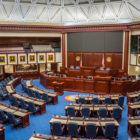
Florida Legislature Must Spend to Further Reform Our Prisons, Help Offenders
|
Florida’s prison system is the third largest in the nation with approximately 95,000 inmates and nearly 164,000 offenders on probation. It’s clear that Florida does a tremendous job of incarceration but we have neglected rehabilitation for far too long. The one question we must ask ourselves when considering how to make long-term improvements to our criminal justice system is, “Are we fostering an environment for Floridians to leave prison better than when they entered?”







